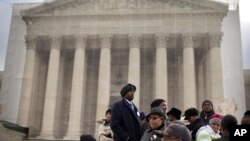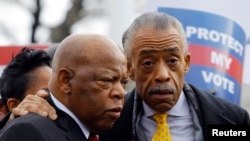WASHINGTON —
U.S. lawmakers are discussing how to ensure equal and unfettered access to the ballot box in the wake of a Supreme Court ruling striking down a key section of the landmark Voting Rights Act of 1965.
Democratic Congressman John Lewis is a living civil-rights legend. As a young man in 1965, he led a march from Selma, Alabama demanding an end to organized suppression of black voter registration, and an end to sometimes-deadly police repression. State law enforcement officers, some on horseback, all of them white, attacked the marchers with batons and tear gas.
The incident shocked the nation.
Months later, Congress passed the Voting Rights Act, which prohibits barriers that “deny or abridge the right of any citizen of the United States to vote on account of race or color.”
Months later, Congress passed the Voting Rights Act, which prohibits barriers that “deny or abridge the right of any citizen of the United States to vote on account of race or color.”
Testifying this week before the Senate Judiciary Committee, Congressman Lewis noted that before 1965, many southern counties had black voter registration rates of less than one percent. Although the situation has vastly improved, Lewis says the battle is not over.
“The deliberate, systematic attempt to make it harder and more difficult for many people to participate in the democratic process still exists to this very day," he said.
Last month, the Supreme Court struck down the section of the Voting Rights Act that subjected states with the most flagrant histories of voter suppression to special scrutiny. Those states had needed federal approval to change election rules.
The court ruled the criteria used to determine which states required added scrutiny were outdated, noting that much has changed since 1965.
Now Congress may step in yet again.
“People die in other parts of the world trying to obtain the right to have a free country with a free right to vote," said Democrat Patrick Leahy, who is chairman of the Senate Judiciary Committee. "Americans should not be denied it by the application of local laws.”
Recent years have seen efforts by some states to impose strict identification requirements to register to vote and cast ballots, which can disadvantage poorer and minority communities. In Florida last November, long lines to vote were particularly acute in some predominantly-black areas. Across the nation, challenges to the delineation of voting districts remain common.
A legislative revisiting of the Voting Rights Act appears to have bipartisan support.
“Congress is now presented with a challenge and a historic opportunity," said Republican James Sensenbrenner, who is chairman of the House Judiciary Committee. "We are again called together to restore the critical protections of the [Voting Rights] act, by designing a new formula that will cover jurisdictions with recent and egregious voting records. We know our work is not yet complete.”
“Congress is now presented with a challenge and a historic opportunity," said Republican James Sensenbrenner, who is chairman of the House Judiciary Committee. "We are again called together to restore the critical protections of the [Voting Rights] act, by designing a new formula that will cover jurisdictions with recent and egregious voting records. We know our work is not yet complete.”
And there is much the Congress can do, according to Loyola Law School professor Justin Levitt, who notes the Supreme Court ruling does not preclude further legislative action.
“It [the ruling] did not say we have fixed the problem of discrimination in voting," he said. "And it did not change the basic truth that the 15th Amendment [to the U.S. Constitution] empowers Congress."
Ratified in 1870, the 15th Amendment to the U.S. Constitution bars denying a citizen the right to vote based on race or color. It states that Congress shall have power of enforcement through legislation.







